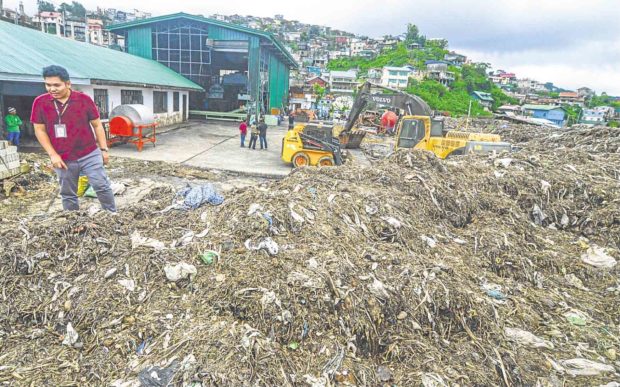Baguio dump rehab: Flower and herb gardens, solar-powered cafes

GOING GONE Trash remaining at the decommissioned Irisan dump in Baguio City will be removed soon as the city government begins its conversion into an ecological park. —KARLSTON LAPNITEN
BAGUIO CITY, Benguet, Philippines — Cafes, gardens and a view deck—all powered by solar energy—are some of the features proposed for the city’s decommissioned dump, which would be converted into an ecological park according to the terms of a 2012 writ of kalikasan.
Details of the plans were released by City Hall last week after Mayor Benjamin Magalong announced that the dump would be turned into a model park by 2021.
The Baguio dump was shut down in 2009 by residents of Barangay Irisan, who feared it had breached its capacity. Following a typhoon in 2011, the dump collapsed, killing seven people and scattering decades-old trash into houses below the 50-meter heap.
Covered by an environmental protection order, the Baguio dump (where 176,600 tons of biodegradable trash and plastics had been deposited) has to be rehabilitated by year-end using a P10-million fund, according to a progress report to the Court of Appeals, which is monitoring how the city is enforcing its writ obligations.
The city government plans to put up floral and herbal gardens in about 4,000 square meters of dump for the first stage of the P17-million project.
Article continues after this advertisement‘Dap-ay’
Article continues after this advertisementTourists may go through grasslands near a “dap-ay” (community assembly area) which will be put up there. The gated park will also have a parking space.
A water-permeable fiber called geotextile will be installed over 9,000 sq m of the dump’s surface to compress loose soil and trash.
Walkways lighted by a system of solar-powered batteries, a food hub, a cactus garden and more dap-ay as well as a tree nursery will be added in the project’s second phase.
Magalong did not say when the park project would start but said two machines that converted kitchen waste into powdered fertilizer had been fixed.
To address the city’s solid waste management as population continues to surge, Magalong said he intended to put up a waste-to-energy plant at a section of the Baguio Dairy Farm reservation that was donated by the Department of Agriculture. —Vincent Cabreza